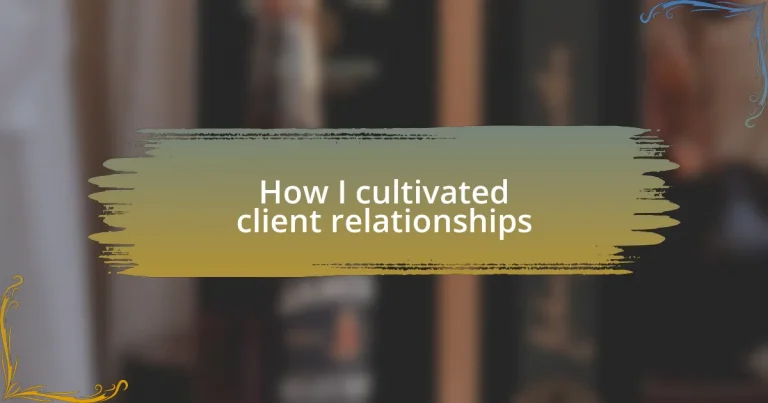Key takeaways:
- Understanding client relationships goes beyond transactions, focusing on personal connections and shared experiences.
- Building strong relationships through open communication, genuine interest, and empathy promotes client loyalty and trust.
- Effective communication techniques, including active listening and simplifying language, enhance client interactions and foster understanding.
- Sharing knowledge about products, along with personal anecdotes, deepens connections and transforms transactions into meaningful experiences.
Author: Clara Whitmore
Bio: Clara Whitmore is an acclaimed author and storyteller known for her captivating narratives and richly drawn characters. Her work spans several genres, including contemporary fiction and historical romance, often weaving elements of personal experience into her writing. Clara holds a Master’s degree in Creative Writing from the University of Edinburgh and has published three novels, which have garnered critical acclaim and a loyal readership. When she’s not writing, Clara enjoys exploring quaint bookstores and hosting literary workshops. She currently resides in Portland, Oregon, with her dog, Jasper.
Understanding client relationships
Understanding client relationships is a nuanced journey, often shaped by mutual trust and shared experiences. I remember a moment when a client confided in me about their search for the perfect whiskey, expressing not just a preference but a longing for nostalgia associated with family gatherings. This connection transformed a simple transaction into a meaningful dialogue, reminding me that understanding clients goes beyond transactions; it’s about crafting experiences that resonate deeply.
Have you ever felt that a small gesture made a world of difference in a professional relationship? Once, after noticing a client’s favorite beverage mentioned in our chats, I surprised them with a bottle during a milestone celebration. The gratitude and joy reflected in their response illustrated to me that personal touches foster loyalty. When you take the time to understand a client’s tastes and history, you cultivate a bond that transcends mere business.
Client relationships flourish when there’s open communication and genuine interest. I’ve often found that asking clients about their experiences can lead to unexpected insights. For instance, I learned that a client had a passion for craft breweries, which opened the door for collaborations that benefited us both. Engaging questions not only build rapport but also create an inviting space for clients to share their stories, making the relationship feel more personal and valued.
Importance of client relationships
Building strong client relationships is crucial in today’s competitive landscape. I recall a time when a long-time client rang me out of the blue, sharing their excitement about a new tasting event they were planning. Instead of just discussing logistics, we reminisced about past collaborations and the joy they brought. It struck me how that personal connection can invigorate a partnership, reminding us that genuine relationships often yield unexpected rewards.
The impact of nurturing client relationships can be profound. I once switched up my routine after noticing a client seemed overwhelmed during a peak season. Instead of my usual checking-in emails, I decided to drop them a quick audio message, expressing my support and willingness to help. Their response was heartfelt, showing how a little thoughtfulness can enhance trust and appreciation, pushing us towards greater shared successes.
Have you ever thought about how your approach affects client loyalty? I’ve experienced that clients who feel valued are more likely to stick around, even when challenges arise. One particular client once shared how after a rough patch, my continued support made them feel more than just a business transaction—they felt like a partner. This insight reinforced in me that fostering relationships isn’t just about making sales; it’s about creating an environment where clients feel seen, heard, and valued.
Strategies for cultivating relationships
One effective strategy I’ve adopted is personalizing communications. I make it a point to remember birthdays or significant milestones of my clients. Recently, I sent a small gift to a client on their anniversary with us. The joy in their voice when they thanked me was a reminder of how small gestures can go a long way in solidifying trust and loyalty.
Another approach I find valuable is to actively seek feedback. I remember inviting a client for coffee to gain insights on their experience with our products. Not only did it provide me with actionable suggestions, but it also showed them that their opinions matter. It sparked a deeper conversation about their business goals, and we ended up brainstorming ideas that benefited us both.
I also believe in being transparent. I once faced a delay with a product shipment and instead of staying silent, I updated my client openly about the situation. Their understanding and appreciation for my honesty only strengthened our relationship. Have you ever faced a difficult moment with a client? I’ve learned that owning up to challenges often creates a stronger bond than simply avoiding uncomfortable conversations.
Building trust with clients
Building trust with clients often hinges on consistent and genuine interactions. I distinctly recall a situation where a client expressed concerns about product quality. Rather than brushing it off, I took the time to meet with them personally to discuss their worries. That meeting not only clarified their concerns but also reinforced their belief that I truly value their experience. Have you ever faced a similar situation? It’s moments like these that reveal the importance of listening.
Another critical aspect of trust-building is follow-through. If I commit to sending additional information or making a change, I ensure that it happens as promised. I once had a client who needed specific data for an upcoming presentation. After I promised to send it by a certain date, I made it a priority. When I delivered the information ahead of time, their relief and gratitude were palpable. Isn’t it rewarding to see how reliability can pave the way for deeper connections?
Lastly, empathy plays a crucial role in trust. I once encountered a client going through a tough financial period. Instead of pushing them for renewals, I initiated a conversation to explore their current challenges and how I could support them better during that time. It’s not always easy, but showing understanding can turn a transactional relationship into something much more meaningful. How often do we take a moment to pause and consider the personal circumstances of those we work with? In my experience, those moments of empathy can truly transform our professional relationships.
Effective communication techniques
Effective communication is pivotal in nurturing client relationships, and one technique that has always worked for me is active listening. I remember a time when a client came to me with a specific concern about a label on one of our products. Instead of jumping to solutions, I made sure to ask open-ended questions that allowed them to fully express their thoughts. By the end of our conversation, not only had I gained valuable insights, but they also felt heard and valued. Isn’t it fascinating how just listening can create a safe space for dialogue?
Another effective communication technique is the use of concise and clear language. In one instance, I was preparing for a meeting with a client who wasn’t familiar with some of the technical terms we often use in our industry. I took extra time to break down complex ideas into straightforward concepts, which led to a more productive meeting. Have you ever tried simplifying your language for a client? It can make a world of difference in understanding and engagement.
Moreover, non-verbal communication should not be underestimated. I once attended an informal tasting event where I observed that some clients were hesitant to express their opinions about certain flavors. By maintaining an open posture and using encouraging eye contact, I created an atmosphere of trust that empowered them to share their thoughts. Can you see how body language can invite more honest conversations? I truly believe that what we say verbally, combined with how we present ourselves, can greatly enhance the quality of our interactions.
Sharing alcohol knowledge with clients
Sharing my knowledge about alcohol with clients has proven to be an invaluable component of building trust. Recently, while hosting a small tasting event, I took the opportunity to discuss the nuances of flavor profiles in various spirits. When I explained how terroir can influence a whiskey’s character, I noticed clients leaning in, genuinely interested. Have you ever felt that spark when someone shares their passion? I realized in that moment that my enthusiasm sparked theirs, deepening our connection.
One time, a client reached out after tasting a particular gin that piqued their interest. They wanted to know more about the botanicals used. I took the time to explain each ingredient and how they interacted with one another. Listening to their excitement as they learned reminded me of my own initial discoveries in the world of spirits. It’s those moments that really stick with both of us, forging a connection that isn’t just transactional but truly relational.
I often find that sharing the stories behind the bottles is where the magic happens. For instance, I once shared the history of a family-owned vineyard and their traditional methods of production. Watching the clients’ eyes widen with curiosity was rewarding; it was as if they were transported to that vineyard themselves. Don’t you think that context can transform a simple purchase into a memorable experience? By providing a narrative, I help clients appreciate the craftsmanship involved, which ultimately fosters a deeper loyalty to the products we offer.
Personal anecdotes from client experiences
During a recent consultation, a client shared their fond memories of a family gathering centered around a rare bourbon. As they recounted their experience, I could sense their nostalgia and attachment to that particular spirit. It made me reflect on how alcohol can serve as a vessel for memories. Have you ever noticed how a single sip can transport you back to a moment in time? It reinforced my belief that selling alcohol isn’t just about the product; it’s about connecting people to their pasts.
There was another instance when I assisted a client in choosing a wine for their wedding. They were overwhelmed by the options but wanted something special that resonated with their relationship. Together, we selected a vintage that had a personal connection to their first date—eight years prior. Their gratitude was obvious when they received the wine; it felt like playing a small yet significant part in their love story. Isn’t it incredible how a bottle can encapsulate a moment in someone’s life?
One of my clients recently shared how discovering a unique craft beer changed their perspective on the beverage. They spoke with such enthusiasm about its aroma and how it reminded them of a summer spent with friends at the beach. Moments like these serve as beautiful reminders of the joy that can come from sharing experiences over a glass. It’s not just about quenching thirst but creating stories worth telling and remembering. How has a beverage sparked a memory for you?


